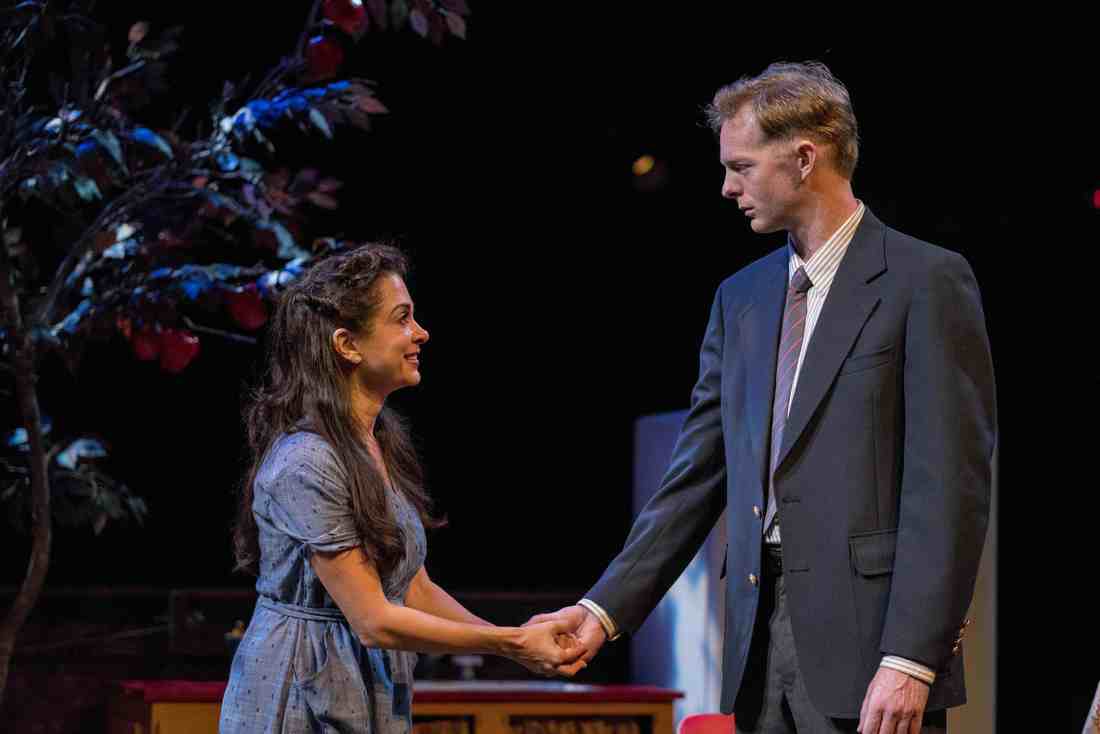|
Jessica John and Brian Mackey in "Smokefall." Photo by Daren Scott The worlds of playwright Noah Haidle’s “Smokefall” are disparate and inscrutable. Act I (titled “Help Me Remember”) unfolds in a Grand Rapids, Mich., that smacks of David Lynch’s fictitious Twin Peaks, Wash. It’s a baleful place where an old man’s fading memory is only one of multiple family disturbances. Act II (“Where We’ll Never Grow Up”) is set in inside the womb of pregnant wife Violet. The unborn twins residing there could best be described as metaphysical vaudevillians. Then there’s Act III (“The Attempt Is How We Live”), occurring more than 70 years in the future, yet somewhere in which the past and the present converge.
In short, 3-year-old Backyard Renaissance could not have picked a more ambitious work to launch its tenure as La Jolla Playhouse’s resident theater company. “Smokefall,” which premiered five years ago at South Coast Repertory Theatre in Costa Mesa, is as challenging a play for audiences as it undoubtedly must be for the Backyard Renaissance cast (Jessica John, Brian Mackey, Francis Gercke, Antonio TJ Johnson and Fedra Ramirez Olivares) directed by Gercke and Andrew Oswald. But in spite of this complex yet literate play’s mind games, it does make for absorbing theater. In the Grand Rapids household, the expectant Violet (Jessica John) goes about her familial duties with resolute smiles, though an aura of sadness envelops her. Husband Daniel (Gercke) is haunted by “malaise and dread,” which foretells his pending departure. Traumatized daughter Beauty (Ramirez Olivares) does not speak, and she subsists on non-nutritious “food” including dirt and paint. The Colonel (Johnson), Violet’s father, is drifting toward dementia. All this is imparted less by the characters themselves than by the onstage presence of a narrator (Mackey), whose spoken “footnotes” provide back story and context. It’s an intrusive device that is the play’s one tangible weakness, though the narrator’s words do demonstrate Haidle’s eloquence and insight into love, loss and the perpetual mystery of time. The ominous tone of the first act is soon washed over by the in-womb antics of Act II. Mackey and Gercke as the unborn twin brothers, each clad in argyle sweaters and matching socks, and attached to neon-glowing umbilical cords, banter like bratty but extraordinarily cerebral kids. Theirs is a nearly slapstick, noogy-filled battle of philosophical existentialism. This debate will have shocking consequences before the third act, when in a less fantastical but equally exigent milieu, the question of whether the course of a life is genetically predetermined is confronted. As the Colonel and later as the aged incarnation of one of the twins, Johnson has the meatiest part in the production, and duly brings the passion and poignancy. John “speaks” expressively with her eyes and benumbed smiles, subtly conveying Violet’s struggle against melancholy. Gercke and Mackey come most alive when wildly in utero together, while Ramirez Olivares melds tender and haunted as the story’s seeker, Beauty. Incongruous and even preachy as it can be at times, “Smokefall” is a risky and venturesome play produced by a company that espouses “gutsy intensity” in its mission statement. Mission accomplished. (Review originally published in the San Diego Union-Tribune on 8/27/18.)
0 Comments
Leave a Reply. |
AuthorDavid L. Coddon is a Southern California theater critic. Archives
July 2024
Categories |
David Coddon |
|
